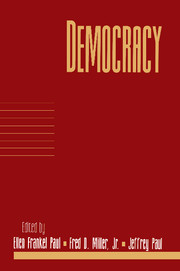Book contents
- Frontmatter
- Contents
- Introduction
- Acknowledgments
- Contributors
- The Very Idea of Popular Sovereignty: “We the People” Reconsidered
- Quasi-Rights: Participatory Citizenship and Negative Liberties in Democratic Athens
- Is There a Duty to Vote?
- Postmodern Liberalism and the Expressive Function of Law
- Democratic Epistemology and Accountability
- Political Quality
- Why Deliberative Democracy Is Different
- The Institutions of Deliberative Democracy
- Democracy as a Telos
- Radical Democracy, Personal Freedom, and the Transformative Potential of Politics
- Democracy and Value Pluralism
- The Problem of Russian Democracy: Can Russia Rise Again?
- Index
Why Deliberative Democracy Is Different
Published online by Cambridge University Press: 03 May 2010
- Frontmatter
- Contents
- Introduction
- Acknowledgments
- Contributors
- The Very Idea of Popular Sovereignty: “We the People” Reconsidered
- Quasi-Rights: Participatory Citizenship and Negative Liberties in Democratic Athens
- Is There a Duty to Vote?
- Postmodern Liberalism and the Expressive Function of Law
- Democratic Epistemology and Accountability
- Political Quality
- Why Deliberative Democracy Is Different
- The Institutions of Deliberative Democracy
- Democracy as a Telos
- Radical Democracy, Personal Freedom, and the Transformative Potential of Politics
- Democracy and Value Pluralism
- The Problem of Russian Democracy: Can Russia Rise Again?
- Index
Summary
INTRODUCTION
In modern pluralist societies, political disagreement often reflects moral disagreement, as citizens with conflicting perspectives on fundamental values debate the laws that govern their public life. Any satisfactory theory of democracy must provide a way of dealing with this moral disagreement. A fundamental problem confronting all democratic theorists is to find a morally justifiable way of making binding collective decisions in the face of continuing moral conflict.
The solutions that most theorists propose make the problem seem more tractable than it is. Because their solutions require the rejection of rival theories, they discount much of the disagreement that gives rise to the problem in the first place. But if, as is the case in pluralist societies and in current theoretical literature, no single theory can reasonably claim to be morally sovereign, the most difficult part of the problem persists: how to deal with the moral conflict that these competing theoretical perspectives express. Furthermore, the problem is not only that the theories conflict with one another, but also that fundamental disagreements arise even within a single theory.
We argue that a deliberative theory of democracy provides a different–and better–approach to this problem because it leaves open the possibility that the moral values expressed by a wide range of theories may be justifiable. Deliberative democracy is a conception of democratic politics in which decisions and policies are justified in a process of discussion among free and equal citizens or their accountable representatives.
- Type
- Chapter
- Information
- Democracy , pp. 161 - 180Publisher: Cambridge University PressPrint publication year: 2000
- 3
- Cited by

